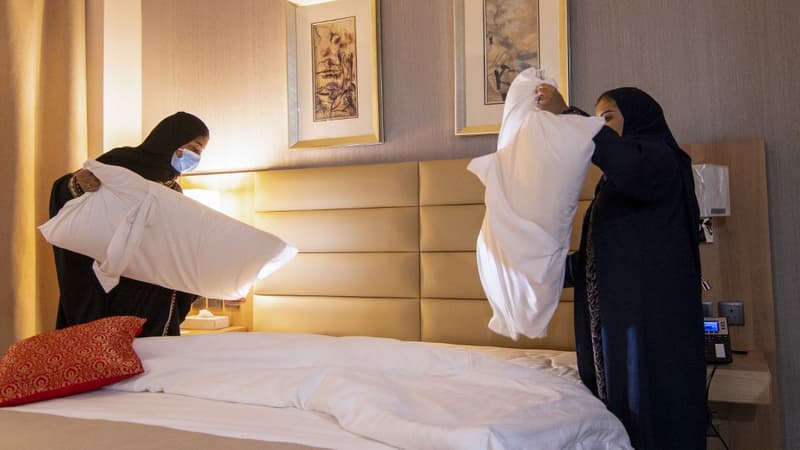Under the watchful eye of an instructor, Munira al-Rubaian learns to change the sheets in a fake hotel room in Riyadh, hoping the training will help her find a job in Saudi Arabia’s nascent tourism industry. Like thousands of Saudis, the unemployed 25-year-old is participating in a program set up by the authorities to train 100,000 future recruits in a sector that will evolve in the coming years.
Waitresses, receptionists, cooks or commercial managers, apprentices are introduced to different trades in specialized centers in the Saudi capital, while others are sent abroad to take intensive courses such as in the Netherlands, Spain, Switzerland or France. The ultra-conservative kingdom, which opened its doors to tourists just three years ago, is counting on these young people to attract visitors and fill jobs traditionally reserved for foreigners.
After trying unsuccessfully to get a job in a hotel, Munira al-Rubaian has high hopes for the “tourism pioneers” program. “I will have the experience and the confidence to serve tourists,” the young woman, dressed in a niqab, told AFP. The initiative is part of the strategy carried out by the young crown prince and de facto leader of the kingdom, Mohammed bin Salman, aimed at diversifying the economy of the world’s largest oil exporter by focusing, among other things, on tourism.
“Saudize the sector”
The country began issuing tourist visas in 2019, just before the coronavirus pandemic, with an ambitious goal of attracting 30 million foreigners a year by 2030, up from four million last year. Including Saudi tourism, the kingdom is targeting 100 million visitors per year by 2030 and the creation of a million new jobs. The sector now employs some 850,000 people, of whom only 26% are Saudi, according to official figures. The “Vision 2030” plan promises to increase this proportion to 70%.
Launched in June, the “Pioneers of Tourism” program has a budget of 100 million dollars, with training covering 52 positions, from reception to management. “We need to develop the knowledge, skills and competencies of the Saudis,” said Mohammed Bushnag, deputy tourism minister in charge of human capital development. The objective is not only to encourage the hiring of local labor, but also to “Saudiize the sector” while providing a quality service.
For young recruits, internships abroad are instructive. During a week in Switzerland, Al-Waleed al-Zaid, a sales manager for a hotel affiliated with an international chain, encountered a very different clientele from the business travelers he is used to in Riyadh. Instead of answering questions about dry cleaning or international calling rates, he was asked about attractions to visit and public transportation. This “allowed me to better understand the expectations of tourists in terms of activities, food and places to visit,” he explains.
Alcohol is still prohibited
In addition to pilgrimages to Islam’s holiest sites, Mecca and Medina, Saudi Arabia is developing new attractions, such as a cultural project near the Nabataean tombs of Al Ula or a spa on the Red Sea, to attract international and local clients. . The authorities have relaxed some rules, allowing for example cinemas and mixed concerts, but alcohol is still prohibited in the country.
To compete with the United Arab Emirates, the region’s top destination, the Tourism Ministry announced last week that residents of neighboring Gulf countries will now be able to apply for e-tourist visas, as will nationals of the 49 countries, mainly in Europe and North America, already authorized to do so.
Source: BFM TV


